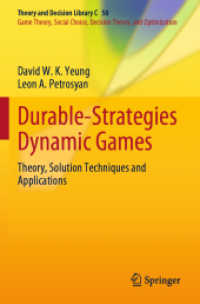Full Description
This collection explores questions of rights and justice from theoretical and practical perspectives, by examining examples of the process and application of the law. The book brings together leading experts and early career academics to consider the application of rights, the achievability of justice and the methods available within varied legal frameworks to secure this. It offers a distinct approach by drawing contributions from a wide range of intellectual arenas thus breaking down legal silos and highlighting the interplay between different subjects. Authors confront the conceptual challenges of rights and justice, beginning with broad constitutional discussions in international and domestic contexts. The book examines institutions, procedure and matters of rights and justice located in numerous social contexts such as regarding interests in - or the protection of - property and the avoidance of discrimination or the protection of beliefs at work. For the younger generation, such questions are long term and, in many ways, evolving. Each chapter offers fascinating insight to support ongoing reflections on rights and justice in the modern world. The book will be of interest to scholars, students and practitioners with interests in human rights, socio-legal studies, areas of law such as family law, criminal law, employment law, as well as access to justice and constitutional justice.
Contents
Foreword, Wendy Joseph; Introduction, Josie Welsh and Louise Hewitt; 1. The Constitutional Right of Access to Justice: A Common Law Story, Jim Tindal; 2. Resolving Human Rights Cases in Strasbourg and at Home: A Contrived Conflict?, Steve Foster; 3. The Role of Multilingualism in Upholding the Rule of Law in the European Union, Susan Wright; 4. Finding Justice - The Tricky Business of Judging, Chris Monaghan and Josie Welsh; 5. Achieving Justice in Imprisonment, Susan Easton; 6. Nemo Dat and Theft: The Need for Clarity of the Impact of the Criminal Status of Rogue Middlemen in Title Conflicts, Sean Thomas; 7. The Injustice of Not Having a Right to an Image, Justin Brunskell; 8. Balancing Individual and Collective Rights in the Religious Workplace, Lucy Vickers; 9. Philosophical Belief Discrimination in the Workplace: How Should Compelled Speech Cases be Dealt With?, Stephen Hurley; 10. The Changing Face of Adoption Law Over the Past Hundred Years: Balancing Rights, or Looking for Solutions?, Felicity Miles; 11. Education Laws as a Foundation for Defining and Normalizing Rights and Justice in Theory and Practice: Addressing the Threat of Disinformation, John Dayton.







